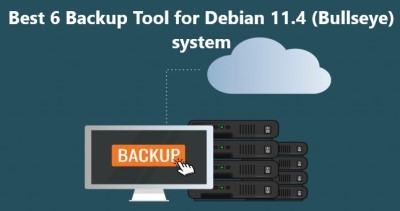The Best 9 open source Anti-Malware Software for Linux users
Linux SoftwareMalware is a malicious code or software used to gain access to a computer or network without the user's consent. Linux users are susceptible to malware attacks since Linux is a popular operating system used by millions of people around the world. It is important to protect your Linux system with anti-malware software to prevent malicious software from compromising your system.
Here at IbmiSoft, we will discuss the 9 best open source anti-malware software for Linux users.
Let's get started.
Table of contents [Show]
1. ClamAV
ClamAV is a free and open source anti-malware software for Linux. It is a cross-platform antivirus engine for detecting Trojans, viruses, malware and other malicious threats. It includes a command-line scanner, an on-access scanner and a scriptable scanner.
Pros of using ClamAV:
- It is a free and open source software.
- It is easy to use and can be easily integrated with other applications.
- It has a powerful scanning engine which can detect threats quickly.
Cons:
- It does not provide real-time protection.
- It is not suitable for novice users as it requires advanced knowledge in order to use it effectively.
Features of ClamAV includes:
- Command-line scanner
- On-access scanner
- Scriptable scanner
- Heuristic detection
- Multi-threaded scanning
- ClamAV Signatures
How to install ClamAV on your Linux system ?
ClamAV can be installed through the terminal using the following command:
$ sudo apt-get install clamav
It's Official website: https://www.clamav.net/
2. Chkrootkit
Chkrootkit is an open source rootkit scanner for Linux systems. It is used to detect rootkits, backdoors and other suspicious files on the system. It is a command-line tool that can be used to scan the system for malicious files.
Pros of using Chkrootkit:
- It is a free and open source software.
- It is easy to use and can be used to scan the system quickly.
- It is highly customizable and can be used to perform scans on specific files or directories.
Cons:
- It does not provide real-time protection.
- It does not scan for viruses.
Features of using Chkrootkit:
- Command-line tool
- Heuristic detection
- Scan specific files and directories
- Outputs scan results to the terminal
How to install Chkrootkit on your Linux system ?
Chkrootkit can be installed through the terminal using the following command:
$ sudo apt-get install chkrootkit
It's Official website: http://www.chkrootkit.org/
3. OSSEC
OSSEC is an open source host-based intrusion detection and prevention system for Linux. It is used to detect, monitor and respond to security threats on the system. It can detect malicious activity and alert the user via email or SMS.
Pros of using OSSEC:
- It is a free and open source software.
- It is highly customizable and can be used to detect a wide range of threats.
- It can be used to detect suspicious activity in real-time.
Cons:
- It is not suitable for novice users as it requires advanced knowledge in order to use it effectively.
Features of OSSEC includes:
- Real-time detection
- Email and SMS alerts
- File integrity monitoring
- Log monitoring
- Rootkit detection
How to install OSSEC on your Linux system ?
OSSEC can be installed through the terminal using the following command:
$ sudo apt-get install ossec
It's Official website: https://ossec.github.io/
4. Rkhunter
Rkhunter is an open source rootkit scanner for Linux. It is used to detect rootkits, backdoors and other malicious threats on the system. It is a command-line tool that can be used to scan the system for malicious files.
Pros of using Rkhunter:
- It is a free and open source software.
- It is easy to use and can be used to scan the system quickly.
- It has a powerful scanning engine which can detect threats quickly.
Cons:
- It does not provide real-time protection.
- It does not scan for viruses.
Features of Rkhunter includes:
- Command-line tool
- Heuristic detection
- Scan specific files and directories
- Outputs scan results to the terminal
How to install Rkhunter on your Linux system ?
Rkhunter can be installed through the terminal using the following command:
$ sudo apt-get install rkhunter
It's Official website: https://rkhunter.sourceforge.io/
5. AIDE
AIDE (Advanced Intrusion Detection Environment) is an open source host-based intrusion detection system for Linux. It is used to detect, monitor and respond to security threats on the system. It can detect malicious activity and alert the user via email or SMS.
Pros of using AIDE:
- It is a free and open source software.
- It is highly customizable and can be used to detect a wide range of threats.
- It can be used to detect suspicious activity in real-time.
Cons:
- It is not suitable for novice users as it requires advanced knowledge in order to use it effectively.
Features of AIDE includes:
- Real-time detection
- Email and SMS alerts
- File integrity monitoring
- Log monitoring
- Rootkit detection
How to install AIDE on Linux systems ?
AIDE can be installed through the terminal using the following command:
$ sudo apt-get install aide
It's Official website: https://aide.github.io/
6. Samhain
Samhain is an open source host-based intrusion detection system for Linux. It is used to detect, monitor and respond to security threats on the system. It can detect malicious activity and alert the user via email or SMS.
Pros of using Samhain:
- It is a free and open source software.
- It is highly customizable and can be used to detect a wide range of threats.
- It can be used to detect suspicious activity in real-time.
Cons:
- It is not suitable for novice users as it requires advanced knowledge in order to use it effectively.
Features of Samhain includes:
- Real-time detection
- Email and SMS alerts
- File integrity monitoring
- Log monitoring
- Rootkit detection
How to install Samhain on your Linux system ?
Samhain can be installed through the terminal using the following command:
$ sudo apt-get install samhain
It's Official website: https://la-samhna.de/samhain/
7. Rootkit Hunter
Rootkit Hunter (rkhunter) is an open source rootkit scanner for Linux. It is used to detect rootkits, backdoors and other malicious threats on the system. It is a command-line tool that can be used to scan the system for malicious files.
Pros of using Rootkit Hunter:
- It is a free and open source software.
- It is easy to use and can be used to scan the system quickly.
- It has a powerful scanning engine which can detect threats quickly.
Cons:
- It does not provide real-time protection.
- It does not scan for viruses.
Features of Rootkit Hunter includes:
- Command-line tool
- Heuristic detection
- Scan specific files and directories
- Outputs scan results to the terminal
How to install Rootkit Hunter on your Linux system ?
Rootkit Hunter can be installed through the terminal using the following command:
$ sudo apt-get install rkhunter
It's Official website: https://rkhunter.sourceforge.io/
8. LMD
LMD (Linux Malware Detect) is an open source malware scanner for Linux. It is used to detect malicious files, backdoors and other threats on the system. It is a command-line tool that can be used to scan the system for malicious files.
Pros of using LMD:
- It is a free and open source software.
- It is easy to use and can be used to scan the system quickly.
- It has a powerful scanning engine which can detect threats quickly.
Cons:
- It does not provide real-time protection.
- It does not scan for viruses.
Features of LMD includes:
- Command-line tool
- Heuristic detection
- Scan specific files and directories
- Outputs scan results to the terminal
How to install LMD on your Linux system ?
LMD can be installed through the terminal using the following command:
$ sudo apt-get install lmd
It's Official website: https://www.rfxn.com/projects/linux-malware-detect/
9. Lynis
Lynis is an open source security auditing tool for Linux systems. It is used to scan the system for vulnerabilities, malware and other security threats. It is a command-line tool that can be used to scan the system for malicious files.
Pros of using Lynis:
- It is a free and open source software.
- It is easy to use and can be used to scan the system quickly.
- It has a powerful scanning engine which can detect threats quickly.
Cons:
- It does not provide real-time protection.
- It does not scan for viruses.
Features of Lynis includes:
- Command-line tool
- Heuristic detection
- Scan specific files and directories
- Outputs scan results to the terminal
How to install Lynis on your Linux system ?
Lynis can be installed through the terminal using the following command:
$ sudo apt-get install lynis
It's Official website: https://cisofy.com/lynis/
[Need Linux Support ? We can help you. ]
This article covers the 9 best open source anti-malware software for Linux users. In fact, Open source anti-malware software provides a powerful and cost-effective solution for defending against malicious attacks. It is designed to detect, identify and remove viruses, spyware, and other malicious software from your computer. We hope this tutorial was helpful in understanding the importance of using anti-malware software for Linux users.
Main features of open source Anti-Malware Software includes:
1. Heuristic Scanning
Open source anti-malware software uses heuristic scanning to identify and block malicious software. Heuristic scanning works by analyzing a file’s behavior and characteristics and comparing it to known malicious patterns. If a file matches a malicious pattern, it is flagged as potentially malicious and blocked from running.
2. Signature-Based Scanning
Signature-based scanning is another type of scanning used by open source anti-malware software. It works by comparing a file’s signature to a database of known malicious signatures. If a match is found, the file is flagged as potentially malicious and blocked from running.
3. Real-Time Protection
Open source anti-malware software provides real-time protection to prevent malicious software from running on your computer. It continuously monitors for malicious activity and blocks it if it is detected.
4. Scheduled Scanning
Open source anti-malware software allows you to schedule scans to be run at specific intervals. This allows you to regularly scan your computer for malicious software and make sure your computer is free from threats.
5. Automated Updates
Open source anti-malware software automatically updates itself with the latest definitions and security patches. This ensures your computer is always protected against the latest threats.
6. Quarantine Mode
Open source anti-malware software includes a quarantine mode which allows you to isolate suspicious files without deleting them. This allows you to investigate the file further before deciding what to do with it.
7. Browser Protection
Open source anti-malware software can protect your browser from malicious websites and downloads. It will block access to any website or download that is known to contain malicious code.
8. Rootkit Detection
Rootkits are malicious programs that are designed to hide themselves from traditional security programs. Open source anti-malware software includes rootkit detection which allows it to detect and remove rootkits from your computer.
9. System Optimization
Open source anti-malware software includes system optimization tools which allow you to optimize your computer’s performance. This includes removing unnecessary files and programs, cleaning up your registry, and defragmenting your hard drive.
10. 24/7 Support
Open source anti-malware software provides 24/7 support via online forums and knowledge bases. This allows you to get help with any issues you may have with the software.



























